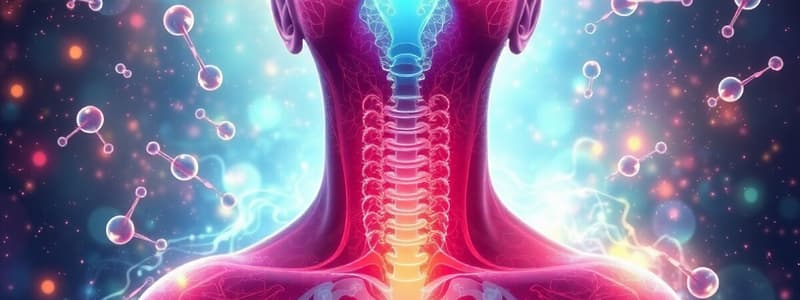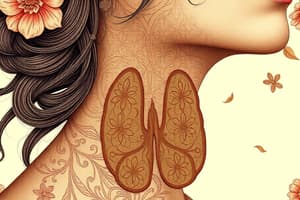Podcast
Questions and Answers
Which of the following is NOT a hormone secreted by the thyroid gland?
Which of the following is NOT a hormone secreted by the thyroid gland?
- Cortisol (correct)
- Calcitonin
- Thyroxine (T4)
- Triiodothyronine (T3)
What mineral is essential for the conversion of T4 to T3?
What mineral is essential for the conversion of T4 to T3?
- Potassium
- Iodine (correct)
- Iron
- Calcium
Which of the following is the MOST common cause of primary hypothyroidism?
Which of the following is the MOST common cause of primary hypothyroidism?
- Iodine deficiency
- Destruction of thyroid tissue (correct)
- Pituitary tumor
- Decreased TSH secretion
Which of the following lab results is expected in a patient with primary hypothyroidism?
Which of the following lab results is expected in a patient with primary hypothyroidism?
Which of the following is associated with congenital hypothyroidism?
Which of the following is associated with congenital hypothyroidism?
What is the term for the potentially life-threatening condition resulting from long-standing, untreated hypothyroidism?
What is the term for the potentially life-threatening condition resulting from long-standing, untreated hypothyroidism?
Which of the following medications could potentially cause hypothyroidism?
Which of the following medications could potentially cause hypothyroidism?
When should levothyroxine be administered to a patient for optimal absorption?
When should levothyroxine be administered to a patient for optimal absorption?
Which of the following indicates the mechanism of action of thyroid replacement drugs?
Which of the following indicates the mechanism of action of thyroid replacement drugs?
A patient with what co-morbidity should use caution with thyroid replacement drugs?
A patient with what co-morbidity should use caution with thyroid replacement drugs?
What is the MOST significant adverse effect associated with thyroid replacement drug therapy?
What is the MOST significant adverse effect associated with thyroid replacement drug therapy?
Why are thyroid replacement drugs contraindicated following a myocardial infarction (MI)?
Why are thyroid replacement drugs contraindicated following a myocardial infarction (MI)?
In which situation is levothyroxine the preferred drug?
In which situation is levothyroxine the preferred drug?
If maternal hypothyroidism is left untreated during pregnancy, what outcome is MOST likely?
If maternal hypothyroidism is left untreated during pregnancy, what outcome is MOST likely?
Which of the following is a common symptom of hyperthyroidism?
Which of the following is a common symptom of hyperthyroidism?
What is the underlying cause of Graves' disease?
What is the underlying cause of Graves' disease?
Which condition is characterized by excessive amounts of thyroid hormones and heightened clinical manifestations?
Which condition is characterized by excessive amounts of thyroid hormones and heightened clinical manifestations?
What is the primary goal of treatment for a thyrotoxic crisis?
What is the primary goal of treatment for a thyrotoxic crisis?
Which treatment modality involves the destruction of thyroid tissue?
Which treatment modality involves the destruction of thyroid tissue?
Methimazole and propylthiouracil (PTU) are examples of what?
Methimazole and propylthiouracil (PTU) are examples of what?
Which of the following describes the mechanism of action of antithyroid drugs?
Which of the following describes the mechanism of action of antithyroid drugs?
Propylthiouracil (PTU) is often used in what situation?
Propylthiouracil (PTU) is often used in what situation?
What is a critical nursing consideration regarding antithyroid drugs?
What is a critical nursing consideration regarding antithyroid drugs?
A patient taking thyroid medication may need an increased dosage of which other medication type?
A patient taking thyroid medication may need an increased dosage of which other medication type?
Which of the following disorders is MOST likely to cause a diffuse thyroid enlargement?
Which of the following disorders is MOST likely to cause a diffuse thyroid enlargement?
A patient with hypothyroidism is prescribed levothyroxine (Synthroid). Which of the following assessment findings would warrant withholding the medication and contacting the prescriber?
A patient with hypothyroidism is prescribed levothyroxine (Synthroid). Which of the following assessment findings would warrant withholding the medication and contacting the prescriber?
A patient with a history of Graves' disease is admitted to the emergency department exhibiting signs of thyroid storm. Which intervention should the nurse prioritize?
A patient with a history of Graves' disease is admitted to the emergency department exhibiting signs of thyroid storm. Which intervention should the nurse prioritize?
A patient who has undergone a total thyroidectomy is being discharged. Which of the following instructions is MOST important for the nurse to emphasize regarding long-term management?
A patient who has undergone a total thyroidectomy is being discharged. Which of the following instructions is MOST important for the nurse to emphasize regarding long-term management?
A researcher is studying the effects of a novel drug on thyroid hormone synthesis. Preliminary data suggests the drug inhibits the enzyme thyroperoxidase (TPO). If this drug were administered to a patient, what would be the MOST likely initial impact on thyroid hormone levels, assuming no compensatory mechanisms?
A researcher is studying the effects of a novel drug on thyroid hormone synthesis. Preliminary data suggests the drug inhibits the enzyme thyroperoxidase (TPO). If this drug were administered to a patient, what would be the MOST likely initial impact on thyroid hormone levels, assuming no compensatory mechanisms?
Flashcards
Thyroid Gland
Thyroid Gland
A gland that secretes three hormones essential for proper regulation of metabolism.
Thyroxine
Thyroxine
A hormone (T4) secreted by the thyroid gland that affects metabolism and growth.
Triiodothyronine
Triiodothyronine
A hormone (T3) secreted by the thyroid gland that affects metabolism and growth.
Calcitonin
Calcitonin
Signup and view all the flashcards
Primary Hypothyroidism
Primary Hypothyroidism
Signup and view all the flashcards
Goiter
Goiter
Signup and view all the flashcards
Congenital Hypothyroidism
Congenital Hypothyroidism
Signup and view all the flashcards
Myxedema
Myxedema
Signup and view all the flashcards
Myxedema Coma
Myxedema Coma
Signup and view all the flashcards
T4 to T3 Conversion
T4 to T3 Conversion
Signup and view all the flashcards
Thyroid Preparations
Thyroid Preparations
Signup and view all the flashcards
Levothyroxine
Levothyroxine
Signup and view all the flashcards
Cardiac Dysrhythmia
Cardiac Dysrhythmia
Signup and view all the flashcards
Hyperthyroidism
Hyperthyroidism
Signup and view all the flashcards
Graves' Disease
Graves' Disease
Signup and view all the flashcards
Thyrotoxicosis
Thyrotoxicosis
Signup and view all the flashcards
Thyroid Storm
Thyroid Storm
Signup and view all the flashcards
Thyrotoxic Crisis
Thyrotoxic Crisis
Signup and view all the flashcards
Radioactive Iodine
Radioactive Iodine
Signup and view all the flashcards
Antithyroid Drugs
Antithyroid Drugs
Signup and view all the flashcards
Beta-blockers for Hyperthyroidism
Beta-blockers for Hyperthyroidism
Signup and view all the flashcards
Anti-thyroid Nursing Considerations
Anti-thyroid Nursing Considerations
Signup and view all the flashcards
Study Notes
- Thyroid disorders involve both thyroid and antithyroid drugs.
Thyroid Gland
- The thryroid gland secretes three hormones essential for metabolism regulation.
- It secretes thyroxine (T4), triiodothyronine (T3), and calcitonin (which helps build T3 and T4).
- The conversion of T4 to T3 requires iodine.
- The thyroid gland lies near the parathyroid gland and is responsible for mantaining adequate calcium levels in extracellular fluid.
Hypothyroidism: Etiology and Pathophysiology
- Hypothyroidism can be primary, secondary, or tertiary.
- Primary hypothyroidism involves an issue with the thyroid gland itself.
- It is commonly related to the destruction of thyroid tissue or defective hormone synthesis.
- Hormone findings in primary hypothyroidism include decreased T3, decreased T4, and increased thyroid stimulating hormone (TSH).
- Secondary hypothyroidism is rare and related to pituitary disease (tumor) with decreased TSH secretion.
- Tertiary hypothyroidism involves a reduced level of thyrotropin releasing hormone (TRH) from the hypothalamus.
Disorders of Thyroid Gland
- The disorders of the thyroid gland can be visualized on a continuum.
- Moving from hyperthyroidism to hypothyroidism goes from thyroid storm, hyperthyroidism, euthyroid, hypothyroidism, and myxedema coma.
Transient Hypothyroidism
- Hypothyroidism may be transient
- It can be related to thyroiditis or discontinuing thyroid hormone therapy.
Congenital Hypothyroidism
- Congenital hypothyroidism involves hyposecretion of thyroid hormone during youth.
- Low metabolic rate, retarded growth, and mental development.
Myxedema
- Myxedema is caused by hyposecretion of thyroid hormone during adulthood.
- It results in a decreased metabolic rate, loss of mental and physical stamina, weight gain, loss of hair, firm edema, and yellow dullness of the skin.
Goiter
- Goiter is caused by the enlargement of the thyroid gland.
- It results from overstimulation by elevated levels of TSH.
- TSH is elevated because there is little to no thyroid hormone in circulation.
Normal Negative Feedback
- Normal negative feedback starts with the hypothalamus releasing TRH.
- Then the pituitary releases TSH.
- Then the thyroid gland releases T3 and T4.
- T3 and T4 are sensed by the hypothalamus and/or pituitary.
- When the T3 and T4 levels are adequate, TRH and TSH turns off.
Goiter Process
- Goiter process starts with the hypothalamus releasing TRH.
- The pituitary releases TSH.
- The thyroid gland does not produce T4 and T3.
- There is no message to stop TRH and TSH.
- Overstimulation results from elevated TSH levels.
- TSH is elevated because there is little or no thyroid hormone in circulation.
Hypothyroidism
- Iodine deficiency causes hypothyroidism because iodine converts T4 to T3.
- It is the most common cause worldwide and prevalent in iodine-deficient areas.
- Atrophy of the gland is the primary cause where iodine intake is adequate.
- Hypothyroidism can also develop because of treatment for hyperthyroidism (Graves Disease).
- Amiodarone and lithium can cause hypothyroidism.
- Treatments essentially kill the gland to stop thyroid hormone overproduction, thus patients need lifelong thyroid replacement prescriptions.
Hypothyroidism: Clinical Manifestations
- Clinical manifestations vary depending on severity and duration.
- Systemic effects are characterized by a slowing of body processes.
- Clinical manifestations range from no symptoms to easily detected physical changes.
- Onset of symptoms occurs over months to years.
- Unless the onset occurs after thyroidectomy, thyroid ablation or treatment with antithyroid drugs.
Myxedema Coma
- Myxedema coma involves mental sluggishness and drowsiness.
- It results in lethargy progressing gradually or suddenly to impairment of consciousness or coma.
- Infection, exposure to cold, trauma, and certain drugs can be precipitants.
- Myxedema coma is characterized by subnormal temperature, hypotension, and hypoventilation.
- The vital functions must be supported and the patient must be administered an IV hormone replacement to survive.
Thyroid Replacement Drug Therapy
- Thyroid hormones are a form of thyroxine (T4), liothyronine (T3), or a combination of T3 and T4.
- Thyroid preparations increase metabolic rate, protein synthesis, cardiac output, renal perfusion, oxygen use, body temperature, blood volume and growth process.
- Thyroid preparations replace what the thyroid gland cannot produce to achieve normal thyroid levels.
- Levothyroxine (Synthroid, Levothyroid, Levoxyl) is a synthetic thyroid hormone T4.
- Liothyronine (Cytomel) is a synthetic thyroid hormone T3.
- Liotrix (Thyrolar) is a synthetic thyroid hormone T3 and T4 combined.
- Oral medications should be taken ½ hour to 1 hour before breakfast to facilitate absorption.
Indications for Thyroid Replacement Drug Therapy
- Thyroid replacement drugs treat all three forms of hypothyroidism
- Levothyroxine is the preferred drug for its predictable hormonal content and effect.
- Thyroid medications are used for thyroid replacement in patients who've had the thyroid glands surgically removed or destroyed.
- It can also be used for emergency treatment of myxedema coma and hypothyroidism in pregnancy.
Adverse Effects of Thyroid Drug Therapy
- Cardiac dysrhythmia, most significant adverse effect of thyroid meds.
- Other adverse effects include tachycardia, palpitations, angina, hypertension, insomina, tremors, and headache.
- Also see heat intolerance, sweating, appetite changes, weight loss from increased metabolism, menstrual irregularities, diarrhea, nausea, and anxiety.
- All medications can result in hyperthyroidism.
Thyroid Replacements Drug Therapy: Contraindications
- Thyroid replacement drugs are not used to treat obesity.
- Because of cardiac stimulation, thyroid replacement drugs are contraindicated following an MI.
Thyroid Replacements Drug Therapy: Interactions
- Binding agents, cholestyramine, antacids, antiseizure medications, and anticoagulants can cause interactions.
Nursing Implications
- Assess for drug allergies, contraindications, potential drug interactions and obtain baseline vital signs as well as weight.
- Use with caution for those with cardiac disease, hypertension, and pregnant women.
- During pregnancy, treatment for hypothyroidism should continue for the well-being of the fetus.
- Fetal growth may be retarded if maternal hypothyroidism is untreated.
- Adjust dosage every 4 weeks to keep TSH at the lower end of the normal range.
Nursing Implications
- Teach patients to take thyroid drugs once daily in the morning.
- Take the medication at the same time every day.
- Not to switch brands without physician approval.
- Patients need to report unusual symptoms, chest pain, or palpitations to a physician.
- Do not take over-the-counter medications without physician approval.
- Therapeutic effects may take several months to occur.
Nursing Implications
- Teach patients the importance of alerting health care providers of thyroid medication use.
- May enhance activity of antiocoagulants (stimulation of glucose)
- Diabetic patients may need increased dosages of hypoglycemic meds.
- May decrease serum digoxin levels.
Hyperthyroidism
- Grave's disease, an autoimmune disease
- Multinodular disease
- Plummer's disease (rare, toxic nodular disease)
- Thyroid storms are all causes of hyperthyroidism.
- Thyroid storm (induced by stress or infection) and is severe and life-threatening.
Hyperthyroidism: Etiology and Pathophysiology
- Sustained increase in synthesis and release of thyroid hormones by thyroid gland.
- It occurs more often in women, in their 20-40s.
- Thyrotoxicosis is the clinical syndrome of hypermetabolism resulting from increased circulating levels of T3 and/or T4.
- Hyperthyroidism and thyrotoxicosis occur together as graves' disease.
Hyperthyroidism: Graves Disease (Etiology and Pathophysiology)
- Grave's disease is an autoimmune disease of uncertain origin.
- It causes diffuse thyroid enlargement and excessive thyroid hormone secretion (T3 and T4).
- Antibodies develop to the TSH receptor, leading to clinical manifestations of thyrotoxicosis, potentially progressing to destruction of thyroid tissue resulting in hypothyroidism.
- Precipitating factors include insufficient iodine supply, infection, and stressful events interacting with genetic factors.
- Grave's disease accounts for 75% of cases of hyperthyroidism.
Hyperthyroidism: Clinical Manifestations
- Hyperthyroidism is related to the effect of thyroid hormone excess and increased metabolism coupled with increased tissue sensitivity to stimulation by the sympathetic nervous system.
- Patients with hyperthyroidism have an intolerance to heat, increased sensitivity to stimulant drugs, as well as an elevated basal temperature.
Hyperthyroidism: Complications
- Thyrotoxic crisis is caused by excess amounts of thyroid hormones.
- It is an acute, rare condition, where all manifestations are heightened (life-threatening).
- Death is rare when treatment is initiated.
- Presumed causes are additional stressors.
Thyrotoxic Crisis: Clinical Manifestations
- Tachycardia
- Heart failure
- Shock
- Hyperthermia
- Restlessness and agitation
- Seizures
- Abdominal pain and nausea
- Vomiting and diarrhea
- Delirium and coma
Thyrotoxic Crisis: Treatment
- Treatment's goal is to decrease thyroid hormone levels and clinical manifestations with drug therapy.
- Therapy aims to reduce respiratory distress and fever, provide fluid replacement and manage stressors.
Treatment of Hyperthyroidism
- Radioactive iodine works by destroying the thyroid gland, but results in lifelong thyroid hormone replacement.
- Surgery removes all or part of the thyroid gland, resulting in lifelong thyroid hormone replacement.
- Antithyroid drugs: thioamide derivatives such as methimazole (Tapazole) or propylthiouracil (PTU).
- Betablockers are used for symptom management only by blocking sympathetic response.
Antithyroid Drugs
- Antithyroid drugs include methimazole (Tapazole) and propylthiouracil (PTU).
- Inhibit the incorporation of iodine molecules into the amino acid tyrosine.
- Tyrosine is required to make T3 and T4.
- Therapeutic uses include Grave's disease and achieving a euthyroid state prior to removal of thyroid.
- This also becomes an adunct to irradiation of the thyroid gland and emergency treatment of thyrotoxicosis.
Anti-thyroid Drugs: Concerns
- Adverse effects include red blood cells, white blood cells, bone marrow toxicity, inability to fight infection, and liver injury.
- Over medication can lead to symptoms of hypothyroidism.
- Drug allergies are the only contraindication.
- Nursing considerations are monitoring vital signs and I&O, weighing a patient.
- Instruct patients to take the medications at a consistent time each day with food, and do not discontinue abruptly.
- Monitor for indications of hypothyroidism, and monitor CBC.
- Beta-blockers may be given to decrease tremors and tachycardia.
Cost of Drugs
- Levothyroxine – 90 tablets is about $56 without insurance.
- PTU - $100 without insurance, $18 with insurance
- Methimazole – 90 tablets $20 with insurance
Studying That Suits You
Use AI to generate personalized quizzes and flashcards to suit your learning preferences.




